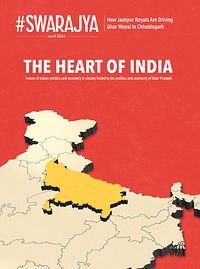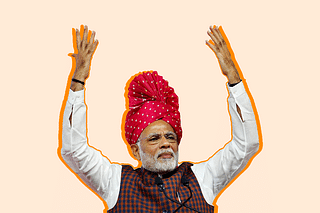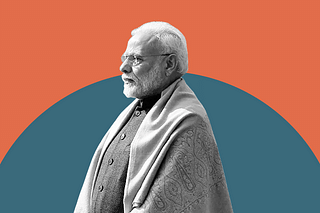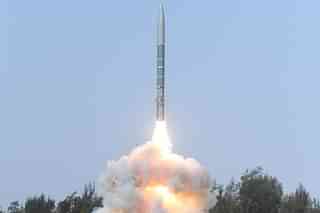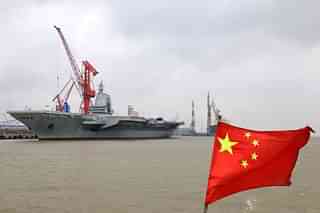World
Russia And The West: How Much Does Europe Rely On Russian Energy And What Are Putin's Options?
Amit Mishra
Feb 04, 2022, 01:01 PM | Updated 01:01 PM IST
Save & read from anywhere!
Bookmark stories for easy access on any device or the Swarajya app.
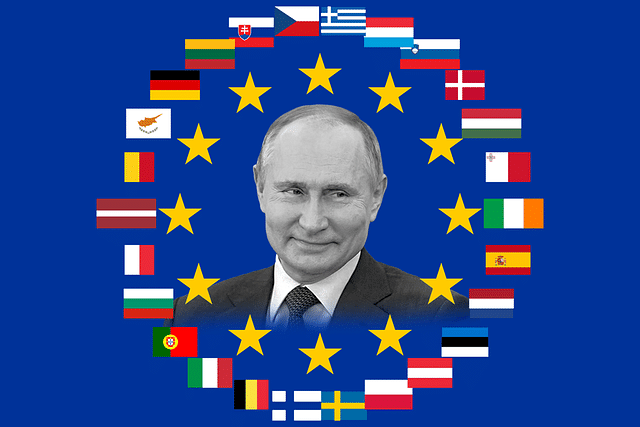
In October 2021, Russia began moving troops and military equipment near the border with Ukraine, reigniting concerns over a potential invasion. By January 2022, Russia has more than 100,000 of its troops stationed on Ukrainian border and Western intelligence has warned that Russia may be planning an invasion of Ukraine in early 2022.
Since the end of the Cold war in 1990, NATO has expanded eastwards by taking in 14 new countries including the three Baltic countries of Estonia, Latvia and Lithuania - all sharing borders with Russia - and Hungary, Poland, Romania and Bulgaria, all members of the former Soviet-led Warsaw Pact. Russia saw the NATO’s eastward expansion (which the alliance calls “enlargement”) as a threatening encroachment towards its borders.
Ukraine has become closer politically to the West after toppling a pro-Russian president in 2014 and Russia believes that its growing ties with the alliance could make it a launch pad for NATO attack.
Unfolding of energy crisis
With geopolitical tensions soaring over Russia’s military build-up, a possibility of fully-blown military conflict cannot be ruled out. The US and some of its European allies have threatened myriad sanctions on Moscow should it decide to move in on Ukraine.
A Russian assault, however, could have the potential for major disruptions to the European energy market, which remains highly dependent on Russian oil and gas and dependence is even higher for Europe's economic powerhouse Germany.
How much does Europe rely on Russian energy?
Russia is an energy giant—the world’s third-largest producer of oil and second-largest producer of natural gas. A major chunk of Russia’s energy output goes to satisfying European demand, especially natural gas sent over a network of Soviet-era pipelines criss-crossing Ukraine and other Eastern European countries.
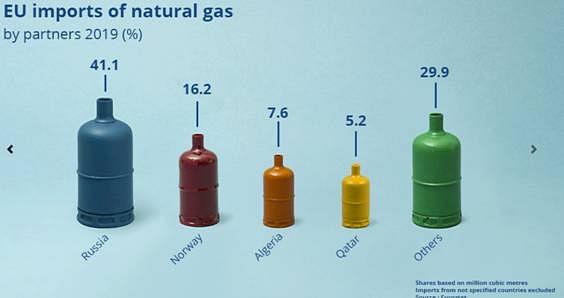
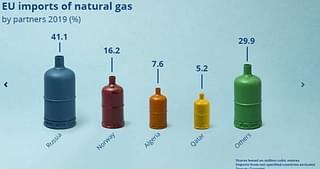
According to Eurostat, more than half of the EU’s energy needs - 61 per cent- were supplied by imports in 2019. The EU mainly depends on Russia for imports of crude oil (27 per cent), natural gas (41 per cent of EU’s natural gas imports) and solid fuels, followed by Norway.
Some EU states are far more dependent than others. Portugal and Spain use little Russian energy, while Germany, the largest European economy, gets more than half of its natural gas and more than 30 per cent of its crude oil supplies from Russia.
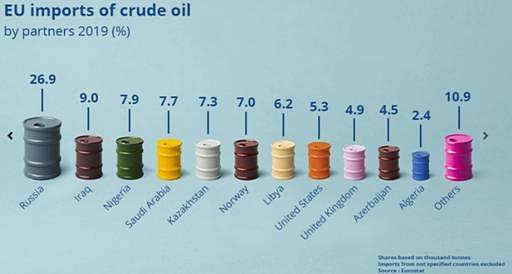
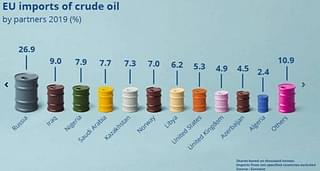
The energy dependency is further compounded by the fact that a number of European countries are actively pursuing transition to cleaner energy sources over the next decade.
Belgium, Austria, Sweden and Portugal have already stopped using coal for power generation. Many have also taken a hostile view of nuclear power and countries like Germany are on their way to completely withdraw from nuclear power within a year or two as it turns its focus to renewables.
The nuclear phase-out and the exit from coal mean natural gas is likely to temporarily fill the gap while the European countries build up their renewable capacity to replace nuclear and coal plants.
German dilemma
The Ukrainian crisis has exposed Germany's problematic dependence on Russian gas, just as Germany faces some of the highest energy prices in the developed world.
A number of factors have converged to make Germany the biggest buyer of Russian gas in the world. Russia now provides for 55 per cent of Germany’s gas imports - up from 40 per cent in 2012 – against around 40 per cent on average for the European Union, according to the EU’s statistics agency Eurostat. This means any supply cut from Russian side would hit Berlin hard and this explains partially why Germany has not been very enthusiastic about the aggressive rhetoric emanating from US and UK.
The ensuing energy crisis has turned the spotlight back onto the controversial Nord Stream 2 project.
Nord Stream 2 (NS2) project is a 1,200-kilometre export gas pipeline which runs under the Baltic Sea carrying gas from western Russia to northeastern Germany. The gas for Nord Steam comes mainly from the Bovanenkovo oil and gas condensate deposit in Western Siberia.
Owned by the Russian state-backed energy giant, Gazprom, the pipeline was completed in September 2021 and has the capacity to handle 55 billion cubic meters of gas per year once it becomes operational, doubling the capacity of the already-in-use Nord Stream 1 pipeline.
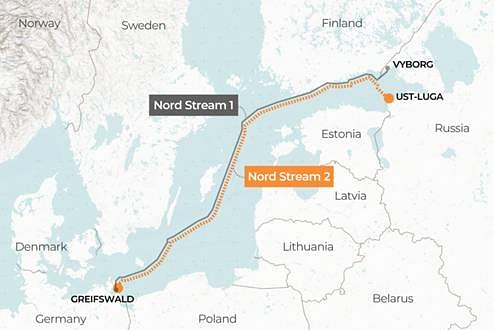
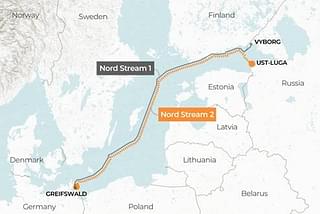
The $11 billion-worth NS2 project is braving a double whammy of environmental activism and strategic objection. The US believes the pipeline would make Europe too dependent on Russia, increasing Moscow’s leverage over Europe, and there is concern that Russia could use it as a geopolitical weapon.
NS2 gas does not transit through Ukraine and it will lose around $2 billion in transit fees once the pipeline becomes operational. The ability to replace Ukrainian pipe infrastructure with direct gas exports to Germany could allow Russia to wage war on Ukraine without having to worry about transit issues.
The price madness
If Europe were to wean itself off Russian gas, it could spike energy prices further, drive inflation, create citizen unrest and undermine Europe’s economic recovery. The gas prices have been soaring to historic highs in Europe and cause great pain to retail consumers. German energy prices have already shot up - they were up 69 per cent in December compared with the same month in 2020.
Governments have been forced to intervene in energy markets to mitigate some of the distress caused by high energy prices. The crisis has pushed German energy companies to secure billions of euros in credit to weather the price surge.
What comes next?
Reducing dependence on Russian gas is difficult as there are no easy replacements, but Europe needs to reduce its dependency on Russia in the near future by diversifying its imports.
One “alternative” would be to source gas supplies from countries like Qatar, Australia. This solution, however, cannot help them avoid short term supply shocks as the lead time for expanding production and export capacity is long. Another alternative is to aggressively look at the option of buying out existing LNG cargoes bound for Asian nations. This involves complex contractual negotiation and China could still play hard ball.
Europe could also look at exploiting liquefied natural gas (LNG) reserves in USA. The US is an important producer of LNG which can be transported by sea to re-gasification terminals and is a convenient alternative to natural gas which can only be transported through pipelines. For a long time, US have been wanting to wean away Europe from Russia and would gladly supply some part of their energy needs.
Putin’s options?
The Kremlin has so far denied using gas as a geopolitical weapon and says that it is delivering on all contractual obligations. A key question is whether Russian economy would be able to weather the economic storm by cutting off gas supplies. As for Russia, fossil fuels account for 14 per cent of the nation’s economic output and revenue from sales of gas and oil is responsible for more than 40 per cent of the federal budget.
Russians have been reliable suppliers to European countries for decades, but they might end up losing their credibility as an energy supplier. The Russian energy behemoth Gazprom could find itself blacklisted from long-term contracts in Europe after such a display of aggressive unreliability.
Even during the height of the cold war, the erstwhile Soviet Union did not disrupt gas supplies. However, Kremlin under Putin is a different proposition. For years now, Russia has stockpiled currency reserves to the tune of over $500 billion and could easily manage to overcome any short term economic difficulties arising out of rubbles lost due to gas disruption.
All this will finally boil down to the question of whether Putin is willing to advance geopolitical interests of Russia and willing to pay the price of long -term damage it may do to Russia as a trustworthy energy supplier. For Europe, any energy supply disruption will have a huge negative impact short-term and medium-term.
Also Read: Explained: The Russia-Ukraine Crisis And What Putin Is Trying To Achieve With It
Save & read from anywhere!
Bookmark stories for easy access on any device or the Swarajya app.
Amit Mishra is Staff Writer at Swarajya.
Support Swarajya's 50 Ground Reports Project & Sponsor A Story
Every general election Swarajya does a 50 ground reports project.
Aimed only at serious readers and those who appreciate the nuances of political undercurrents, the project provides a sense of India's electoral landscape. As you know, these reports are produced after considerable investment of travel, time and effort on the ground.
This time too we've kicked off the project in style and have covered over 30 constituencies already. If you're someone who appreciates such work and have enjoyed our coverage please consider sponsoring a ground report for just Rs 2999 to Rs 19,999 - it goes a long way in helping us produce more quality reportage.
You can also back this project by becoming a subscriber for as little as Rs 999 - so do click on this links and choose a plan that suits you and back us.
Click below to contribute.
